News
Congratulations to Leslie Lodge!!
7 April 2025
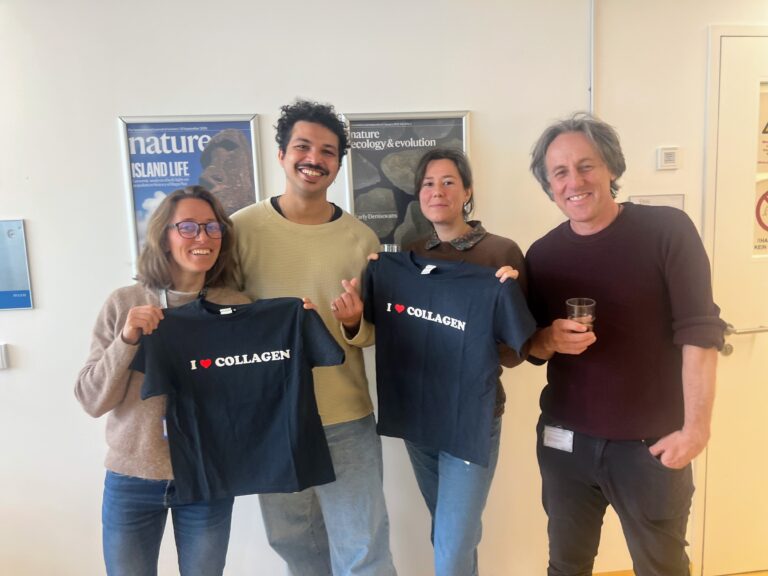
Many congratulations to our Masters student Leslie Lodge for passing his viva this week. Leslie’s dissertation focused on the difficult challenge of extracting collagen from bones from the archaeological site of Grotta del Cavallo in Italy. He developed a novel approach and tailored a specific method for the low collagen bones he was analysing. This work resulted in new dates from the crucial EIII level at the site, and the earliest dates ever obtained for the Uluzzian. We are very proud of Leslie and grateful for the wonderful t-shirts he gave us!
Congratulations to Katharina Luftensteiner!!
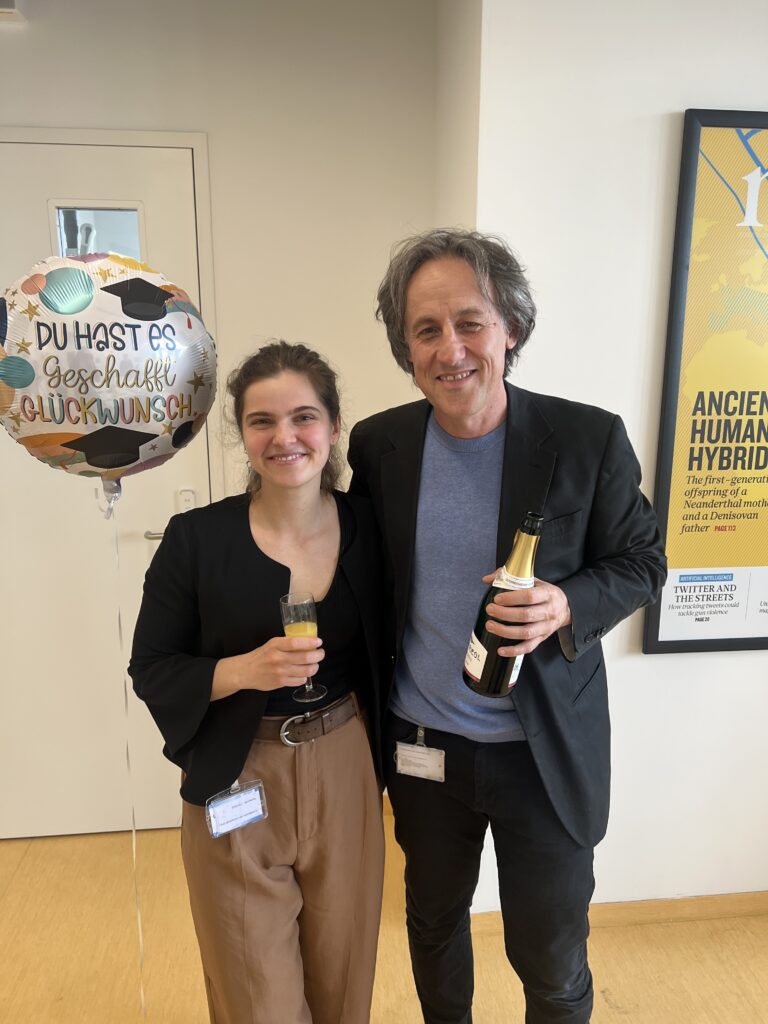
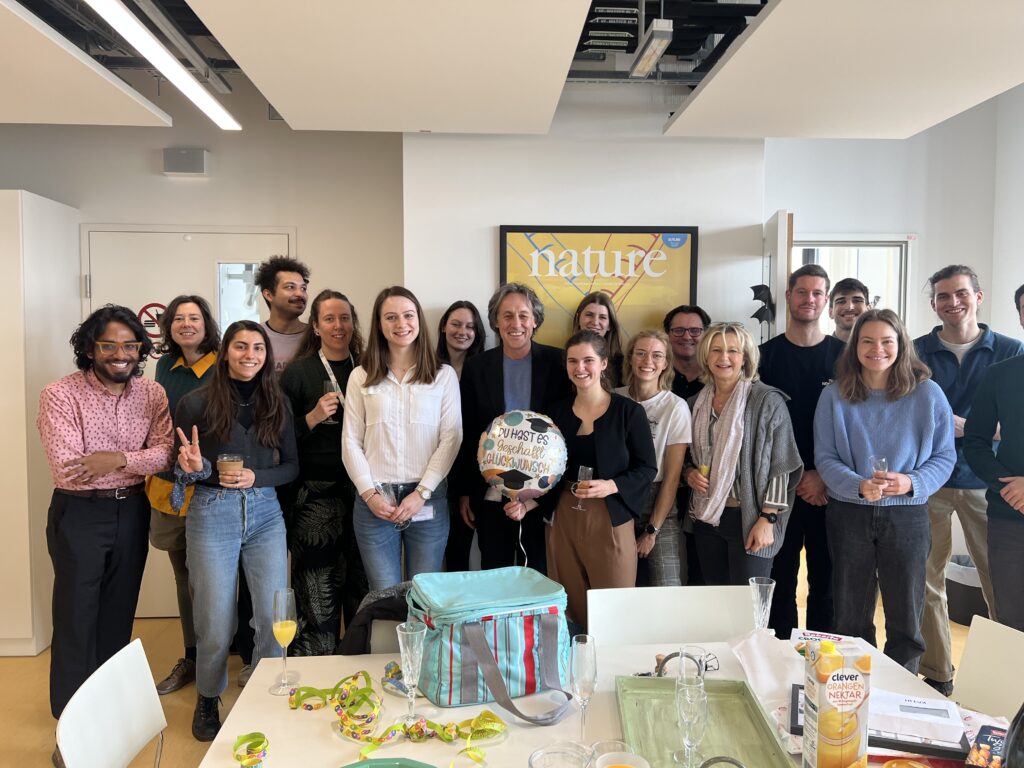
Many congratulations to our Masters student Katharina Luftensteiner for her thesis presentation and defensio today! Katharina passed with a score of Very Good (1)! Extremely well-deserved! She did a great presentation and followed this up with excellent answers to questions, from examiners and the audience. Well done Kathi!
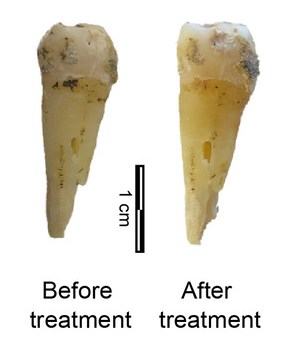
Non-destructive radiocarbon dating paper published
We have published our pre-print on dating bone using a novel non-destructive protocol we developed. The paper is on biorxiv here:
https://www.biorxiv.org/content/10.1101/2025.03.26.645488v1
We present a novel non-destructive method for radiocarbon dating bone and teeth. Routine techniques are destructive. We employed an extraction in hot water at 90 degrees to solublise collagen from archaeological bones without any visible damage. This was followed by ultrafiltration to purify the extracts. The resulting amino acid composition, isotopic values and analytical data support the interpretation that the collagen was consistent with that obtained using destructive protocols. Comparison between 14C ages revealed statistical parity between non-destructive and traditional methods across different archaeological samples across 50,000 years. This new approach provides us with the opportunity to extract biomolecules for dating and other analyses without having to damage or destroy valuable artefacts and objects.
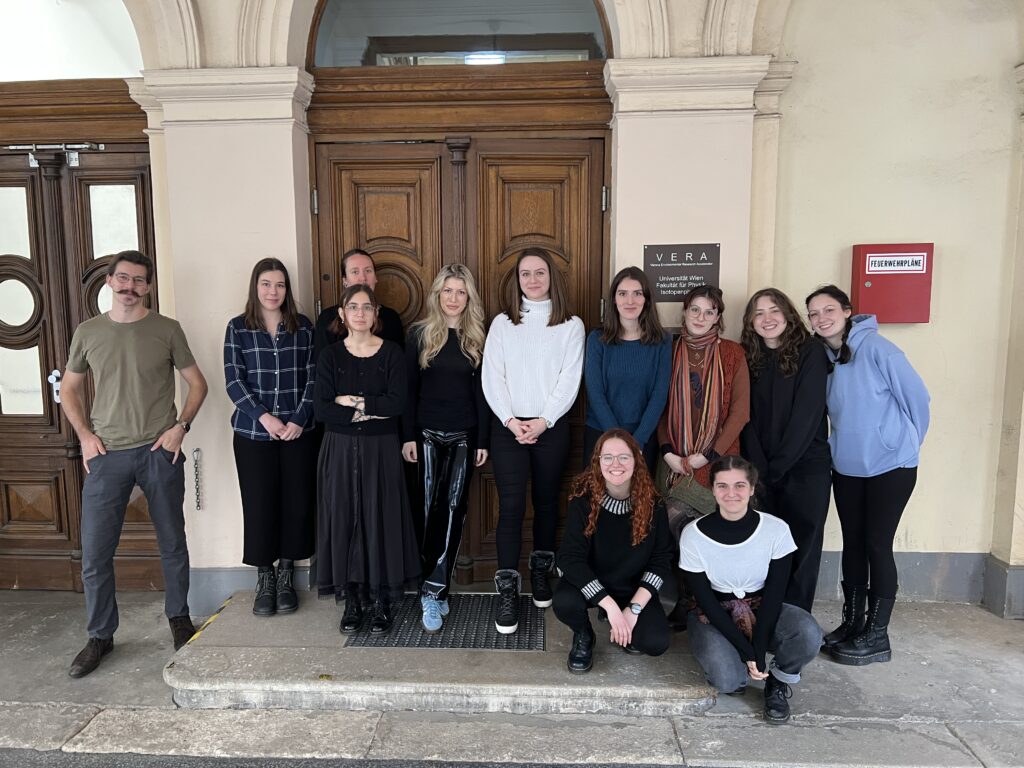
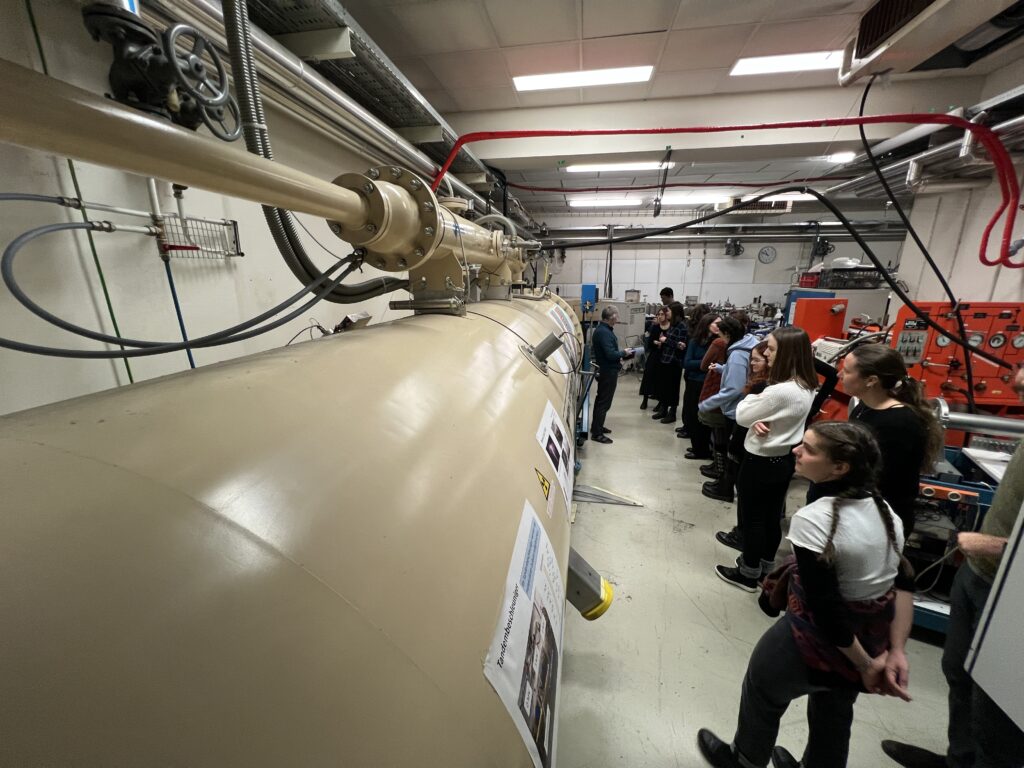
Radiocarbon Practical course
The Higham Lab is running its first practical course for radiocarbon dating, designed for Masters students. It is led by Tom Higham, Laura van der Sluis and Maddalena Giannì.
This January 10 young Master’s students are working in the Higham Lab learning all about radiocarbon dating methods. They spent the first week in the lab pretreating samples of ancient Palaeolithic bone and bone standards using the Lab’s chemical pretreatment methods for ultrafiltration. This week they visited the graphitisation and AMS laboratories at VERA and the rest of the week will be taken up with final sample freeze-drying, weighing, a Bayesian modelling workshop and reports on the radiocarbon results. The following week will be their presentations, in which they will do a conference-style presentation on the results of the AMS dating work, Bayesian modelling and interpretation.
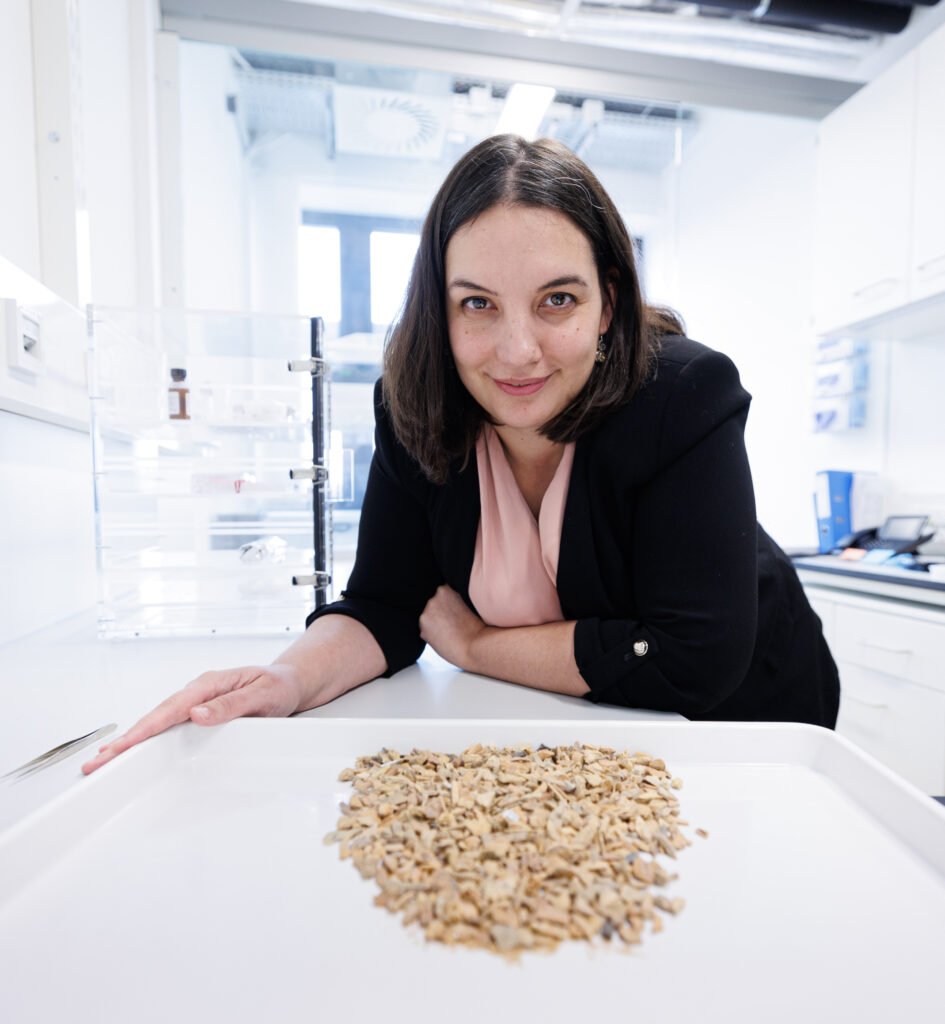
Katerina Douka wins ERC Consolidator grant
3 December 2024
Katerina Douka has won a prestigious ERC Consolidator grant. The project is called “Tracking the dispersal of humans from the African Rift to the Pacific Rim using biomolecular approaches” or “RIFT-TO-RIM” for short.
The project’s principal objective is the discovery and analysis of new early modern human fossils from under-researched parts of the world. State-of-the-art paleoproteomic and paleogenetic methods will be used to screen thousands of archaeological bones, and hundreds of sediment samples for molecular clues. The material will be collected from 21 archaeological sites in six countries (South Africa, Lesotho, Kenya, Ethiopia, Indonesia and Papua New Guinea), dating to between 200,000 and 10,000 years ago.
Congratulations Katerina!
ESHE Conference 2024
15 September 2024
Members of the Higham Lab attended the 2024 ESHE Conference in Zagreb. ESHE is the European Society for Human Evolution. Laura van der Sluis, Maddalena Gianì, Emily Pigott, Alisa Redtenbacher and Katharina Luftensteiner attended along with Tom Higham. The team presented three posters, one podium talk and a Pecha Kucha presentation. The conference fieldtrip took in the world-famous Neanderthal sites of Vindija and Krapina. Other members of the University of Vienna to attend include Prof. Gerhard Weber, Ass. Prof. Mareike Stahlschmidt, Dr Pere Gelabert, Larissa Bartsch, and Petra Šimková.
One of the highlights of the week was meeting Prof. Svante Pääbo, the Nobel Laureate from the Max Planck Institute for Evolutionary Anthropology and close collaborator with Tom and Katerina Douka working on the Denisova Cave site.
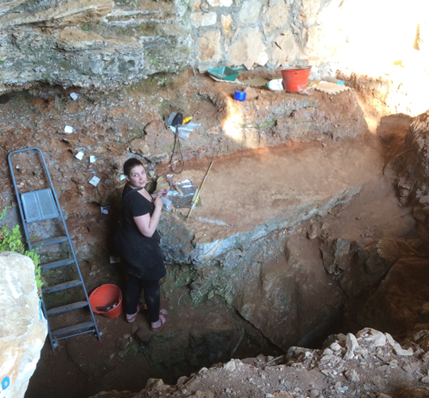
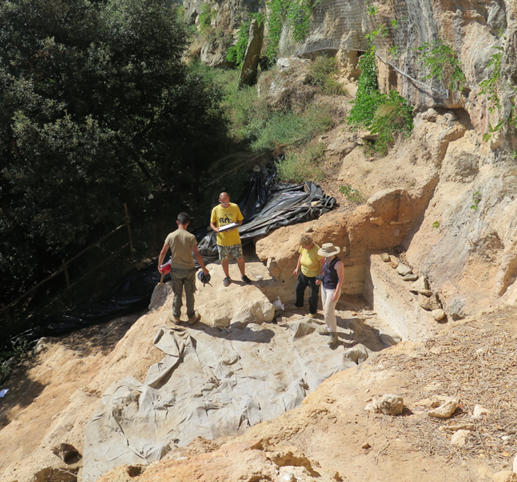
New research shows no direct contact between Neanderthals and early Homo sapiens in the Italian Peninsula 43 thousand years ago
12 September 2024
A new study published in the journal Nature Communications, led by Tom Higham, suggests that Neanderthals in the Italian Peninsula left these territories well before the arrival of Homo sapiens, around 43 thousand years ago. The same study highlights how the first groups of Sapiens, the makers of distinctive so-called “Uluzzian” stone tools, were themselves then replaced by other groups belonging to a second wave of Sapiens originating from northern Italy.
An international team of researchers led by Tom Higham, Katerina Douka, Francesco Boschin and Adriana Moroni (University of Siena) obtained more than 100 radiocarbon and optically stimulated luminescence dates from some of the most important archaeological sites in the Italian Peninsula. The evidence from careful excavation of archaeological layers, along with the dating results, led the team to the same conclusion; the existence of a gap in time between the last Neanderthals and the arrival of the first Sapiens. The lack of interaction between the two populations is also confirmed by the material culture, which do not exhibit evidence of contact.
‘This is the most comprehensive chronometric study ever carried out in Italy on this most important phase of human prehistory,’ said Professor Higham of the University of Vienna. ‘The statistical combination of several dating methods within the chronological models has improved the precision of both intra-site investigations and the comparisons between different sites’.
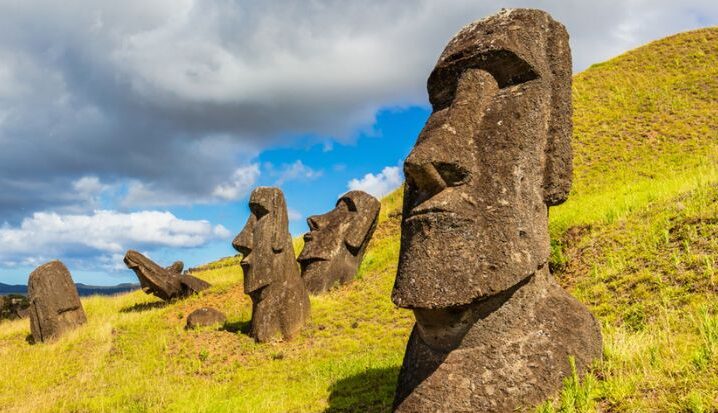
Rapa Nui (Easter Island) paper published in Nature
11 September 2024
A new study published this week in Nature has called into question the long-standing theory of population collapse on Rapa Nui prior to the arrival of Europeans, and shown admixture occured with Indigenous Americans just after Polynesians first arrived.
Rapa Nui (Easter Island) with its gigantic statues and treeless landscape has fascinated researchers for centuries. It is one of the most isolated inhabited places in the world. Located in the Pacific, lying over 1,900 km east of the closest inhabited Polynesian island and 3,700 km west of South America. Two key elements of Rapa Nui history remain very controversial to this day. One of these is the theory of population collapse through “ecocide” or “ecological suicide” in the 1600s, thought to be the result of overpopulation and resource mismanagement. The other major contention is whether the Polynesian ancestors of the Rapa Nui interacted with Indigenous Americans before contact with Europeans in 1722.
A team spearheaded by Assistant Professor Víctor Moreno-Mayar (University of Copenhagen) and Associate Prof. Anna-Sapfo Malaspinas (University of Lausanne), as well as Professor Tom Higham, generated key new data on these questions in the paper.
By generating high-quality ancient genomes from the 15 Rapa Nui individuals, the team found that about 10% of the Rapa Nui gene pool has an Indigenous American origin. But more importantly, they were able to infer both populations met before Europeans arrived in the island and in the Americas. This was done by Tom Higham using Bayesian modeling of the radiocarbon dates of the individuals. This enabled the team to show that admixture, and therefore contact, occured between the 13th and the 15th centuries.
Tom Higham wins ERC Advanced grant
11 April 2024
We are delighted to announce that Tom Higham has obtained an ERC Advanced grant for the 2023 round of €2.94 million. This will support his research project called “Disperse”.
Humans evolved in Africa around 250-300,000 years ago and later moved into Eurasia, likely via the Levant. Tom Higham and his team are investigating when and how often this happened and, in particular, what happened when Homo sapiens first encountered Neanderthals and other kinds of humans, such as the Denisovans. The researchers are focusing on Ksar ‘Akil in Lebanon, one of the deepest and most important archaeological sites in the Levant, which is more than 60,000 years old and contains a detailed historical record of when the first modern humans arrived in the region.
In the ‘Disperse’ project, scientists will reopen the site by removing all fill from previous excavations in the 1930s/40s and 1970s. The latest sediment DNA techniques will be used to determine the presence of different hominins through the archaeological sequence, date the site reliably, analyse its stone tool remains and generate a record of its paleoenvironmental and climatic history. This will allow them to build a reliable record of cultural change through time and understand far more the details of this late period of human evolution. In tandem the team will also work on a number of other sites across Eurasia to explore the timing and dispersal of these earliest humans. Tom will work with a core team of Lebanese archaeologists, including Prof. Corine Yazbeck, who will lead the archaeological work. Alongside a team of international experts will be involved as well as 4 postdoctoral scientists and a PhD student.
Publication of Scientific Reports paper on collagen glue identification and removal
24 January 2024
The contamination of samples of bone from archaeological sites can be a critical problem for radiocarbon dating or DNA analysis. Sometimes the contamination derives from natural sources, but there are also dangers derived from the treatment of material in museum collections. Glues made from collagen represent a major problem for archaeological scientists, particularly when the ancient biomineral target is bone collagen.
Laura van der Sluis spearheaded a team exploring this and whether new methods could be use to identify and treat problem samples. She undertook experimental work to deliberately contaminate bones using collagen glue and then tested the effectiveness of methods designed to remove this material prior to radiocarbon dating. She applied ZooMS (Zooarchaeology by Mass Spectrometry) to test whether collagen glue from different animal sources could be identified. Two extraction methods for ZooMS were tested to identify the authentic animal species of a range of objects, which were shown to be originally whale bones. The results showed that some had been consolidated with modern cattle collagen glue. This is the first time animal collagen glue has been identified in archaeological remains with ZooMS. Radiocarbon dating protocols are not able to distinguish collagen from different animal sources so it is incredibly important, in instances where collagen glue contamination is suspected, that methods such as ZooMS are applied to detect these before analysis. The methods outlined in the paper represent an important step forward in demonstrating the power of these screening methods to ancient bones.
The paper was published in the journal Scientific Reports.
“Mostly Out of Africa” conference
6-7 November 2023
Tom Higham was invited to speak at the “Mostly Out of Africa” conference, in honour of Professor Chris Stringer, who was awarded the Huxley Medal from the Royal Anthropological Institute. The conference comprised invited speakers who had previously worked with Prof. Stringer, one of the originators of the idea that Homo sapiens originated in, and then dispersed out of Africa into the rest of the world. Tom spoke about the spread of the Initial Upper Palaeolithic across Eurasia, focusing in particular on the sites of Kara-Bom and Grotte Mandrin.
Kara-Bom paper published
4 November 2023
The key site of Kara-Bom, in the Siberian Altai of Russia, is one of the most important sequences dating to the Initial Upper Palaeolithic. The chronology has remained uncertain, until the publication of a large new suite of results obtained through Tom Higham’s ERC grant “PalaeoChron”. The new chronometric results show that Homo sapiens occupied the site as early as 49-46,000 years ago. “The reliable dating of sites like Kara-Bom will enable us to calibrate the possible dispersal of human ancestors across Eurasia after 50,000 years ago. Kara-Bom is one of the key sites, containing evidence for early ornaments, novel stone tool industries and bone points.
Laura van der Sluis wins Young Investigator award 2023
8 September 2023
We are delighted to report that Higham Lab senior scientist Dr Laura van der Sluis has been awarded one of the 2023 Young Investigator Awards from the University of Vienna. The prize comes with €1,000. We are very proud and happy that Laura’s scientific achievements have been recognised in this way and wish her the very best in her ongoing scientific career.
Tom Higham appears on WSF program "Brave New Prehistoric World"
4 May 2023
The World Science Festival featured a new programme this week hosted by American theoretical physicist Prof. Brian Greene of Columbia University called “Brave New Prehistoric World”, focusing on the recent period of human evolution. Tom appeared with Professor Becky Ackermann (Univ. of Cape Town), Professor Sheela Athreya (Texas A&M) and Dr Viviane Slon (Tel Aviv University) to discuss the latest breakthroughs in evolutionary anthropology, including new genetics and dating developments, and the dramatic changes in our appreciation of issue such as genetic admixture and hybridisation among members of the genus Homo.
The programme has been viewed a huge number of times since airing (20,000 views in 4 days)!
Neanderthal hunting trophy site discovered
26 January 2023
A Spanish site called Cueva Des-Cubierta has provided new evidence showing that Neanderthals may have had an interest in building shrines using hunting trophies. Archaeologists at the site, led by Prof. Enrique Baquedano, found animal bones with cut marks and modifications that suggest they were used for the creation of hunting trophies. The skulls found included steppe bison (Bison priscus), steppe rhinoceros (Stephanorhinus hemitoechus), aurochs (Bos primigenius) as well as red deer (Cervus elaphus). All animals had horns. The specimens numbered more than 30 and each had been heavily processed, with brains and jaws removed before being arranged within the site. The body parts found were not high in nutrition and naturally very heavy. It seems likely that the animals were processed for their meat away from the site and the skulls deliberately processed and brought to the Neanderthal camp. The dates of the site are not precise, but broadly fit between 70-50,000 years ago. These findings add to the growing body of evidence suggesting that Neanderthals engaged in symbolic behavior, including the creation and use of hunting trophies, and they provide valuable insights into the cognitive abilities of early humans.
Neanderthals, Denisovans and Homo sapiens: How new science is changing our understanding of human evolution
12 December 2022
In his inaugural lecture at the Main Ceremonial Hall of the University of Vienna Professor Tom Higham gave an overview of his research, which involves applying cutting-edge archaeological science methods to the ancient past, particularly to the period from around 70,000–30,000 years ago when Neanderthals, Denisovans and modern humans met and interacted with one another. Watch the recording by following the link below.
Image © feelimage/matern
Higham Lab features on the best of CBC’s Quirks and Quarks science programme
27 August 2022
The story of how Homo sapiens moved into Europe often speaks about a swift replacement of the Neanderthals, but this is being challenged by exciting new evidence. Tom Higham was part of a team that undertook research on a key cave dwelling in France, and found that it was alternately occupied by Neanderthals and humans over thousands of years. The findings were published in the journal Science Advances, and have new light on the story of early humans in Europe.
ORF news article 'On the trail of the inner Neanderthal'
16 August 2022
Austrian national broadcaster ORF ran a story on our research exploring the archaeological record of early humans and what traces are left from the genes of Neanderthals and Denisovans. For example, Neanderthal DNA can influence whether someone has addictive behaviours or or is a morning or evening person. The ancient genome also provides insights into the social life of these early ancestors.
What motivates Tom Higham and Katerina Douka?
5 May 2022
Watch the Rudolphina video to find out!
What ancient genes tell us about who we are
4 May 2022
A new article about Tom and Katerina in the University of Vienna’s science magazine “Rudolphina” covers their approach to solve the great mystery of human evolution: Why are we the only humans left?
Tom Higham in an interview with VISÃO
24 March 2022
Tom Higham is featured in this months edition of the popular Portuguese magazine Visão. The article covers the release of the Portuguese edition of his book The World Before Us (“O Mundo antes de Nós – Como a Ciência Está a Descobrir uma Nova História para as Origens Humanas“) on March 24.
Our Early Denisovans and their lithics made the Jan Nature Ecology and Evolution front cover!
12 January 2022
Newly discovered hominin bone fragments from Denisova Cave in Siberia are the earliest dated evidence for the Denisovan lineage, and some of the oldest human fossils ever genetically sequenced! Our team, led by Assistant Professor Katerina Douka and Dr Samantha Brown, used ‘ZooMS’ (Zooarchaeology by Mass Spectroscopy) to analyse ancient proteins in 3,791 tiny bone fragments extracted from the site’s oldest layers. They found 5 tiny bones, three of which turned out to be Denisovans and one a Neanderthal!
Outreach: Tom Higham featured in Viennese science magazine "Wien Wissen"
16 December 2021
On four pages, the article describes “The World Before Us” and our research on dating and sequencing our ancestors’ remains, including Denny’s.
Moving to Vienna!
1 August 2021
After 20 years at the University of Oxford I’ve moved to Vienna to take up a role at the University of Vienna’s Department of Evolutionary Anthropology. I’m really delighted that, along with my wife, Assistant Professor Katerina Douka, we can now work in the brand new Biology Building, and develop new and novel approaches to studying the past using biomolecular methods. We are setting up new radiocarbon and proteomics preparative laboratories in Vienna, so keep watching this space!